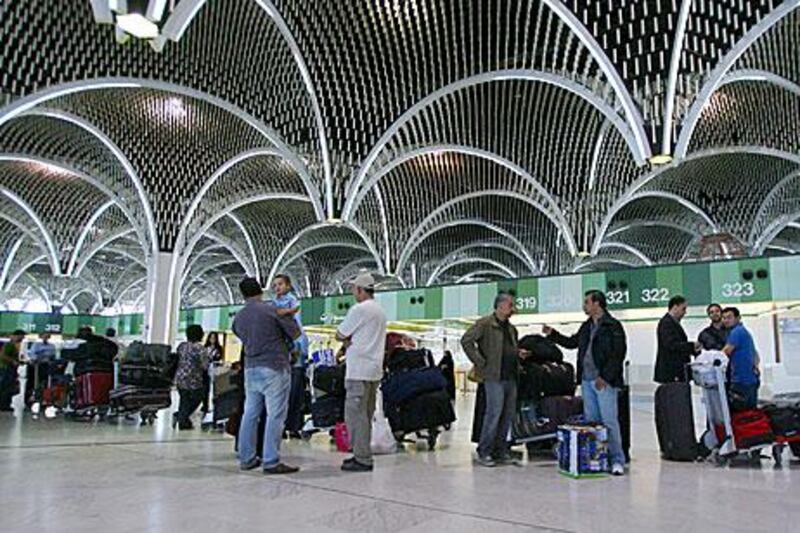Potential exists for companies wishing to cash in on the huge airport infrastructure developments planned for the country, but governmental and regulatory obstacles will provide a rough ride, write Ivan Gale and Hadeel al Sayegh
While there are huge opportunities in developing airport infrastructure in Iraq, investors are also finding the country has equally large political and regulatory hurdles to overcome.
A country with 31 million residents and the world's fourth-largest oil reserves, Iraq is woefully underserved by existing transport infrastructure.
Many of the airports are former military airbases without modern-day facilities - but there are enormous plans for the future.
Baghdad International Airport will be doubled in size and add another three terminals, each capable of handling 2.5 million passengers a year. It will also receive a cargo centre and free zone, a business park, retail outlets and hotels. In total, five airports including Basra, Erbil and Najaf will be upgraded, while the Mid-Euphrates Airport, located between Najaf and Kerbala and designed to cater for Shiite religious pilgrims, is being built.
The development is trying to keep pace with foreign airlines that have rushed to serve pent-up demand for air travel among residents and an estimated four million religious tourists annually, as well as catering to the US military, diplomats and reconstruction officials.
Since 2006, the country's airports have welcomed 10 foreign airlines including Austrian Airlines, Gulf Air, Etihad Airways, Emirates Airline, Lufthansa and flydubai. The latest route is Emirates's Dubai-to-Basra service slated to begin in June. "Since the 2009 oilfield bid, traffic from the US and Europe into Basra has increased significantly and we are ready to capitalise on this growth," said Sheikh Ahmed bin Saeed Al Maktoum, the chairman and chief executive of Emirates.
Such flights are being made possible due to the insurance industry's reclassification of Iraq away from the most dangerous, and uninsurable categories. "Iraq is not seen as a war zone but as a hostile environment from an insurance perspective," said Ian Crowe, an aviation development director at Willis, an insurance broker with offices in Dubai. He said operators were evaluated on a case by case basis on whether they qualified to be insured for air services into the country.
In addition, although Iraqi Airways'sentire fleet was recently grounded to avoid a lawsuit from Kuwait Airways, it is expected to be resurrected to take an important role in the sector's development. The Iraq government is still under contract for dozens of short-range and long-range aircraft from Boeing.
The country's aviation growth is underpinned by overall economic development with GDP expected to grow 7 per cent this year and another 8 per cent next year, according to the Iraqi government. Much of this will be driven by its oil production, with plans to export US$306 billion (Dh1.12 trillion) worth of oil between now and 2014.
As air travel grows, opportunities will abound for companies engaged in airport construction as well as service firms covering areas such as aircraft maintenance.
Cargo terminals in the country need to be upgraded and supplied with IT equipment to improve efficiency and transparency, while airports also need suitable air traffic control systems and passenger terminals, said Robert Strodel, the executive advisor at Rus Aviation, based in Sharjah, which runs cargo flights in Iraq. "[Airports] also need to be upgraded with manpower and modern equipment in order to turn around aircraft speedily," he said.
Yet, while these developments are all a sign that the country is finally brushing off the image of a war zone, barriers to entry and major challenges remain.
The government has lacked leadership following inconclusive elections in March. "Who is the government currently?" said Hussein Damirji, a partner at Patton Boggs based in Doha. "We still don't know, we haven't known for eight months. How can you enter into a multimillion [dollar] contract with the government of Iraq right now when you don't know who the government is going to be in a few months?" Another important issue for airport projects is disputed land. Iraq had 163,000 outstanding land claims as of September. "Some investors think that the government can write off any land claims that are disputed in order to go ahead with the project but it does not work that way," Mr Damirji said.
In addition, the courts in Iraq are still ill-equipped to arbitrate in cases brought by foreigners. "Investors have fears about who they are operating with, who are their local partners, how they will guarantee that their rights are legally upheld and how efficient and clean the courts are," he said.
Other concerns are alleged sweetheart deals with certain firms. Earlier this year, the Middle East Business Aviation Association complained to the Iraqi government about Palm Jet, an executive jet operator, claiming the company had a monopoly on all chartered business travel in and out of Iraq, while other operators faced increased clearance and landing costs. Transparency International, the anti-corruption watchdog, has said Iraq still suffers from rampant bribery and nepotism.
The mixed bag of opportunities and risks may push some companies to stand on the sidelines for now. Georges Hannouche, the chairman and chief executive of Bayanat Airports Engineering and Supplies, said his firm was ready to do business in Iraq when the conditions were right.
"I see big potential," he said. "We just want to know who are the decision makers, what are the projects the government is seeking to do and what its approach to the market is."
halsayegh@thenational.ae





